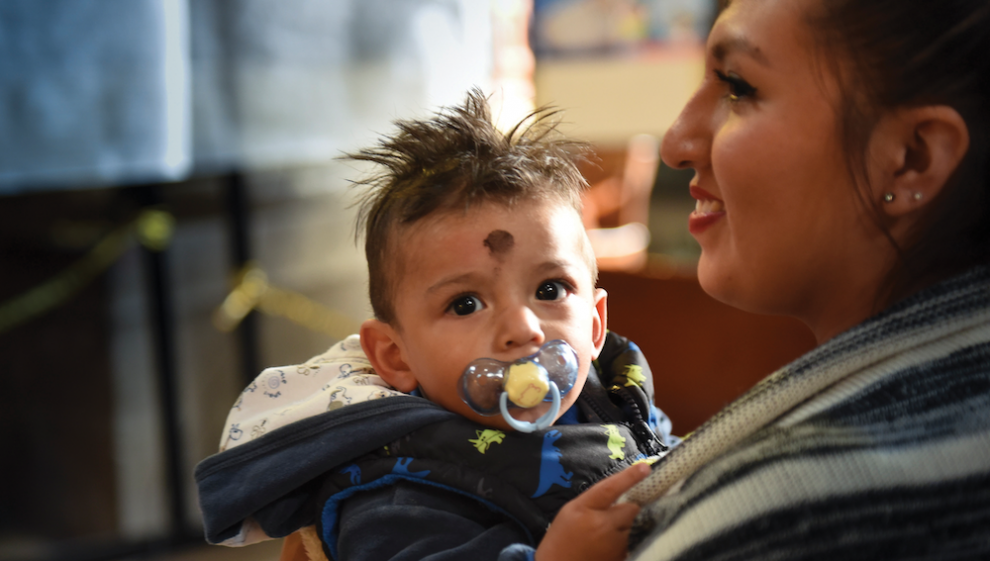As a new parent, I received all kinds of advice. While I have no doubt that the admonitions, ranging from “enjoy every minute” to “take time for yourself,” were well meaning, they weren’t exactly helpful. Short of our pediatrician’s suggestions for sleep training (truly, sharing this information is the Lord’s work), I filed most new-parent advice into the same folder of my brain where I once stored the reigning dates of English monarchs.
It’s not that I don’t have mountains to learn from people who have trod the journey of parenthood before me. I’m constantly calling my mom and dad with questions, checking out parenting books from the library, and begging the guardians of well-behaved toddlers for their secrets during coffee hour after Sunday Mass. Specific answers to specific questions are invaluable, but broad and abstract advice, given out of context, has never landed for me.
Except once.
When I was in divinity school—years before becoming a mom—I took a class on the sacramental imagination, and the professor made a comment pertaining to parenthood that lodged itself in the easy-access file of my brain. Along with the go-to temperature for roasting vegetables, a passage from my favorite Wendell Berry poem, and—now that I’m a parent—the singsongy lines to Chicka Chicka Boom Boom, I not only remember the words but think of them often.
“The only thing we guarantee our children,” this professor remarked during a discussion about the father-son duo in Cormac McCarthy’s haunting novel The Road (Vintage), “is death.”
As our babies let out their first startled wails in the delivery room, we have no idea how their lives will unfold. No matter where we live, how much money we have, what opportunities we provide, or how desperately we love them, we can’t guarantee our children health, success, fulfillment, or longevity. But even as their personalities and passions are a mystery, we do know from their earliest hours of life that one day they will die.
While contemplating my child’s death sickens me and certainly doesn’t pair well with lullaby soundtracks and the smell of baby skin, it happens, for me at least, unconsciously. Ever vigilant for objects that could block air passages, hazards to safe sleep, and other threats to her fragile, precious life, I find that imagining my daughter’s death comes more naturally to me than imagining my own. Of course, I know intellectually that my days are numbered, but like the well-meaning yet unhelpful parenting advice, my eventual death is too abstract for me to consider with any real seriousness.
I’m not unique in this regard. Keeping our eventual deaths at the forefront of our minds is a challenging concept called memento mori that was developed in the early centuries of Christianity. Memento mori, a Latin phrase that translates to “Remember you must die,” is, in short, the practice of meditating on death. The idea behind memento mori is that by reflecting on our death, we will be inspired to live rightly in the present. In the words of the author of the Book of Sirach (7:36): “In all you do, remember the end of your life, and then you will never sin.”
Because being mindful of our last is easier said than done, memento mori typically involves a physical object that serves as a reminder of our mortality. For instance, medieval monks and nuns were known to keep skulls on their desks, and I’ve heard that Mary Moody Emerson, the eccentric aunt of the American transcendentalist Ralph Waldo Emerson, slept in a bed shaped like a coffin and used a funeral shroud for a blanket. For people in the modern world, memento mori might manifest as a tattoo of an hourglass or a piece of jewelry that recollects a near-death experience.
For me, parenthood is memento mori. As I look at my daughter and painfully acknowledge my powerlessness in protecting her from eventual death, I am reminded of my own mortality. This, in turn, guides how I live. By calling to mind life’s finitude, parenthood shines a light on the importance of living fully in the present moment. I better appreciate the joy and beauty of the everyday—the comforting taste of a cup of Earl Grey tea, the eruption of giggles during a dramatic reading of Good Night, Gorilla, the smell of honey whole wheat bread baking in the oven—knowing that it will one day end. In the words of the poet Emily Dickinson, “To make Routine a Stimulus / Remember it can cease— / Capacity to Terminate / Is a Specific Grace.”
Parenthood also reminds me to use my time well, because I don’t know how much time I have left. Dreams, goals, and hopes take on an urgency when we realize that we only have so much time to actualize them.
Finally, parenthood calls me to live in a way that, if I were to die tomorrow, I would be satisfied with how I spent my days. Did I tread gently over this tender earth? Did I devote my time to meaningful work? Was I more generous, more courageous, and more compassionate than felt comfortable? Did I contribute more than I consumed? Did I not so much seek, in the words of St. Francis, to be consoled as to console, to be understood as to understand, and to be loved as to love?
A few weeks after my daughter’s birth, our newly minted family-of-three ventured from the apartment for one of our first evening outings together to attend an Ash Wednesday Mass. For the same reasons that I’m drawn to the concept of memento mori, I’ve always loved this liturgy. The solemnity and message of the service are orienting even as they are sobering. But this year, as a new parent, the service took on fresh layers of meaning for me as my infant daughter, barely a month old and nestled in the crook of my arm, also received ashes on her forehead.
There are no guarantees in the journey of parenthood but this: We are dust and to dust we shall return. Live accordingly.













Add comment